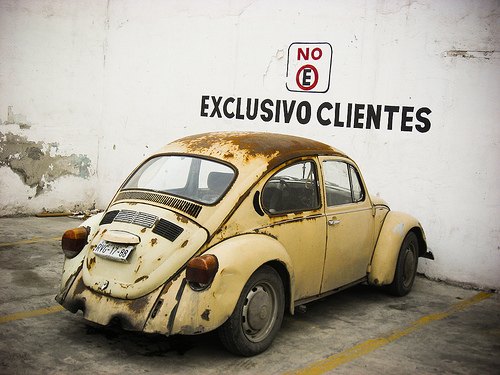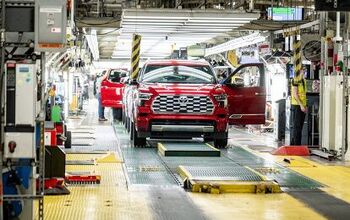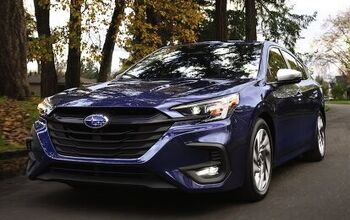Will No One Rid Me Of These Troublesome Baby Boomers?
Statistically speaking, it’s a little early to be ragging on the baby boomers. In addition to numerical advantages, the boomers also haven’t slipped fully into retirement, meaning mainstream culture will be stuck for a little longer in the era of unrepentantly rosy nostalgia. And though the pasturing of America’s second-greatest-by-default generation will be ruinous for little things like government entitlement programs, the benefits to important stuff like car design will be profound. Unlike subsequent generations, the baby boomers still had the privilege of living during the golden age of the automobile, a time before Detroit’s decline, the massive government regulation of safety and emission standards, and the general blandifying of the car. As a result, boomers bring a bizarrely retro-sensibility to the modern car market, not just for restored classics, and retro-muscle cars, but for the vehicles that brought an end to the era of Detroit Baroque. Which is where things get interesting.
In many ways, the parallels between the current market and the market which was turned on its head by the popularity of the VW Beetle are eerie. The growth in size, weight and complexity of modern automobiles is a more sophisticated parallel with Detroit’s longer, lower, wider obsession. Sure, chrome, tailfins and power have been replaced by cupholders, heated seats and shadetree-proof engines, but the essential problem remains: as car companies have given us more of what we think we want, we become disconnected from the pure, elemental experience of motoring. More weight, more expense and more features are sold as the tools of freedom, but in fact their main contributions tend to be in the forms of greater costs, mechanic dependence and debt.
The Volkswagen Beetle was launched into a market that, like our own, was caught in a runaway spiral of more. Seen by Detroit’s executives as a rolling joke, the Beetle’s appeal was rooted in its otherness. Designed as a tool of transportation and social liberation rather than as an expensive, complex consumer good, the Beetle tapped into a growing dissatisfaction with the culture of more. The gruff, underpowered engine, the lack of creature comforts, the liberating ease of repair work, and the quirky design were all direct rejections of what was then the Detroit Way. Did the boomers make the Beetle one of the most successful modern car designs, or did the Beetle show the boomers that another way was possible, thus setting them on their quixotic course? An easy answer isn’t obvious.
But one thing is for certain: somewhere along the way, the boomers, like the Beetle, lost their desire for revolutionary simplicity. Even the Beetle succumbed to the siren song of more, yielding puffy embarrassments like the Super Beetle before giving way to more modern designs. Though it soldiered on in the developing world, America’s baby boom discovered that Japanese cars offered more while still providing a rugged simplicity that has evaded Detroit to this day.
But Crowns and 210s gave way to Camrys and Accords, which gave way to bigger, faster, more complicated Camrys and Accords, which in turn spawned Acuras and Lexuses. Caught up in the self-reinforcing cycle of more, the Japanese firms expanded the size, weight, and content of their cars until the distinctions between Detroit and the transplants were no more. And then they added even more.
And yet, despite pushing the auto industry back into the cycle it once gleefully rejected, the baby boomers maintain an unhealthy obsession with the automotive forms that captivated them during their turbulent youths. Cars like the Wrangler Unlimited, New Beetle and MINI make huge money for their parent brands by selling simplicity nostalgia for huge markups, by offering the look of the rugged, counter-cultural past, without any of the downsides [see this NYT [sub] review of the Wrangler Unlimited for a taste of this dynamic]. Which, of course, means that these nostalgic cars offer little to none of the attributes that actually made them popular.
Not that there’s anything inherently wrong with this. Everyone’s entitled to a little nostalgia, and if it sells at a profit, so much the better. The problem, as usual, is that baby boomers have a hard time seeing past their own needs. What consumers younger than baby boomers are missing from the market isn’t a car that looks like a Beetle, but a car that shakes up stale market assumptions the way the original Beetle did. A car that competes at the low end of the market, but will still be desirable in 30 years, like the original Mini. Will anyone be lovingly restoring a Hyundai Accent several decades from now?
Meanwhile, industry insiders scratch their heads and puzzle as to why “the kids” don’t buy cars the way they used. They blame computers, the internet and video games, and try desperately to include the techno-gadgets they think will renew fresh enthusiasm for their products. But kids don’t not buy cars because they fail to integrate Twitter properly, or require stepping away from a computer or Playstation for five minutes. Rather, why should young people get excited about cars, when the lessons of the car industry’s last great youth movement have been so thoroughly perverted and caricatured?
This rant was inspired by some news about the forthcoming Volkswagen New Beetle replacement. The news (as such) is wildly predictable: the New New Beetle will be built on a Jetta platform, offer the same engines, and possibly come with a hybrid option. Otherwise, the changes will be largely stylistic. Having imagined a much smaller, cheaper and fundamentally different Beetle based on a single cruel rumor, news that VW wouldn’t fundamentally change the Beetle’s design came as an (in retrospect, predictable) disappointment. But expecting the poster child for the boomers’ betrayal of their automotive rebellion to reignite an automotive counter-culture was never realistic.
Nor would it be appropriate. Breaking with the past requires something new, unbeholden to nostalgic profit-mongery. Otherwise, what will the car companies re-sell parodies of to us young folks when we grow up, decide that our revolution is over and start demanding four-zone climate controls and tomb-like interiors? Certainly not the Beetle. The boomers ruined that one.
More by Edward Niedermeyer
Latest Car Reviews
Read moreLatest Product Reviews
Read moreRecent Comments
- Poltergeist I expect this will go over about as well as the CR-Z did 15 years ago.
- Michael S6 Welcome redesign from painfully ugly to I may learn to live with this. Too bad that we don't have a front license plate in Michigan.
- Kjhkjlhkjhkljh kljhjkhjklhkjh A prelude is a bad idea. There is already Acura with all the weird sport trims. This will not make back it's R&D money.
- Analoggrotto I don't see a red car here, how blazing stupid are you people?
- Redapple2 Love the wheels


































Comments
Join the conversation
Therein lies the problem. The New Beetle wasn't a terrible car, but it was terribly compromised for the sake of style... which became its only unique selling proposition. The same can be said, to a certain extent, of the New Mini... which at least had the decency of being extremely interesting to drive... part of the original Mini's USP that made it through to the remake. Unfortunately the new Mini sacrifices too much of the incredible interior space (incredible for its size, that is) that the old Mini was known for simply to be the best driver's car it can possibly be. This isn't a safety thing, mind you... the new Mini sacrifices a lot of interior space to fit the complex and bulky BMW Z-axle in the rear. This limits rear seat space and gives the Mini boot space that isn't much bigger than the SMART ForTwo. Part of the charm of the old Mini was its ability to extract so much performance from such a simple suspension pacakge. BMW didn't want to take such chances with the new one, and threw everything they had at the new one, in order to make sure it stuck. If you want quirky little cars that consume very little fuel, are fun to drive and are incredibly practical (as well as incredibly safe for their size), you have no further to look than the Honda Fit and the original Scion xB. Cars which are quirky, full of personality, have all of the "basics" people need and are much safer than the tinny little Mini or the "don't drive on bridges in crosswinds" Beetle or even some of the body-on-frame relics that still populate our roads (both in terms of active safety and crash structure integrity). And yet these cars are becoming increasingly fatter as customers demand more space, more power, more features... at least Honda has avoided the temptation to fit a 1.8 liter engine to the Fit and call it a Maxi-Fit, though the new car lacks much of the spunk of the older one... Toyota, on the other hand, went the whole hog with the xB... turning it from a Gen-Y poster-child (almost as iconic for the anti-car generation as the Beetle was for its time) into a fancier looking RAV4. People think that it all comes down to safety. It doesn't. You can still have cars that have charm and personality even with the smothering weight of safety requirements. It's all the other things that customers demand... or seem to demand... that make cars today overcomplicated, fussy, and hard to love. Present them with an alternative that shows them that different can also be good, and they'll buy it in droves. And then come the inevitable customer clinics... and the ruination of the product. Whoever mentioned Steve Jobs is spot on. I've long been an Apple skeptic, and I don't own an Apple product... but every time I use one... it just feels so right. Apple focuses on making their products efficient, simple and user-friendly instead of trying to keep up with the joneses... and it works. Apple users may be damn smug... but they have a good reason to be. While the rest of us are stressing over multitasking ability, processor speed and storage space, Apple users are simply enjoying their products.
Great article. Unfortunately calling for smaller and simpler goes no-where. The market is what it is, and baby boomers are a part of it just like enthusiasts. A new base Fiesta (or equivalent) is 100 times the car that the VW Beetle ever was, meets all our criteria for simple, cheap, light, sporty, is even safe, but none of us are buying them. It's not sporty enough. It's not light enough. Or it's too light, not safe in an accident with a pickup truck. That's how we justify it though it proves that we are hypocritical in our regular big appliances. What we should do is put our money where our mouth is. If we could convince 10,000 enthusiasts to buy a base Fiesta for $13K, start a whole nationwide community of get-togethers, forums, mods, aftermarket parts, etc, we would be living the dream within a year or two. Just the idea makes me smile and want to whip out the line of credit. But it won't happen.